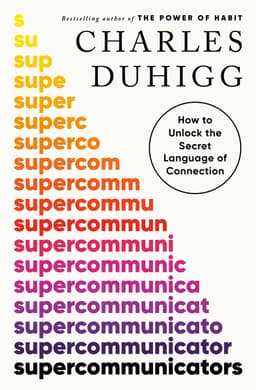
Super Communicators Book Summary
How to Unlock the Secret Language of Connection
Book by Charles Duhigg
Want to read the full summary?Click here to read for free!
Summary
Who and what are supercommunicators? They're the people who can steer a conversation to a successful conclusion. They are able to talk about difficult topics without giving offence. They're brilliant facilitators and decision-guiders. How do they do it?
Sign in to rate
Average Rating: 3.43
These are the best quotes from Supercommunicators by Charles Duhigg. If you want to read a full summary of this book for free, click here.
"Effective communication requires recognizing what kind of conversation is occurring, and then matching each other."
- Charles Duhigg
Section: 1, Chapter: 1
“Miscommunication occurs when people are having different kinds of conversations. If you are speaking emotionally, while I’m talking practically, we are, in essence, using different cognitive languages. (This explains why, when you complain about your boss—“Jim is driving me crazy!”—and your spouse responds with a practical suggestion—“What if you just invited him to lunch?”—it’s more apt to create conflict than connection: “I’m not asking you to solve this! I just want some empathy.”)”
- Charles Duhigg
Section: 1, Chapter: 1
Learning Conversations
“Our goal, for the most meaningful discussions, should be to have a “learning conversation.” Specifically, we want to learn how the people around us see the world and help them understand our perspectives in turn.”
- Charles Duhigg
Section: 1, Chapter: 1
“Hearing people describe their emotional lives is important because when we talk about our feelings, we’re describing not just what has happened to us, but why we made certain choices and how we make sense of the world.”
- Charles Duhigg
Section: 3, Chapter: 3
Importance of Social Dialogues
"Social dialogues—Who Are We? conversations—are gateways to deeper understanding and more meaningful connections. But we need to allow these discussions to become deep, to evoke our many identities and express our shared experiences and beliefs. The Who Are We? conversation is powerful not only because we bond over what we have in common, but because it lets us share who we really are."
Section: 3, Chapter: 7
Perfection Cannot Be The Goal
Davis later told me that, in these kinds of conversations, what’s
important is realizing how we might inadvertently contribute to problems
like inequality. The aim is not to say the exact right thing, or to arrive at the
perfect insight. Perfection can’t be the goal, “because if you’re trying to say
the perfect thing, nothing authentic is going to happen,” he said. “The goal
is staying in the conversation, finding space for messy learning and
supporting each other.”
Section: 4, Chapter: 7

